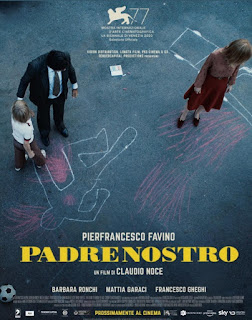Part of my coverage of the 56th Chicago International Film Festival.
PADRENOSTRO ***
BLURB: Call it the influence of Neorealism or something else entirely, but Italian cinema has long produced some of the medium’s most striking youth performances. This tradition is reinforced by Padrenostro, a stirring historical coming-of-age story organized around the perspective of a ten-year-old boy. Introverted and comfortably sheltered in his middle-upper class household, Valerio has no idea how to process an assassination attempt on his father, a commanding man of undisclosed vocation. Exemplifying the film’s canny eye-level camerawork, Noce initially shoots the skirmish from the balcony of the boy’s family’s high-rise apartment; when Valerio rushes down to witness the aftermath, the sudden closeup of a bloodied, dying hitman understandably sears itself into his inchoate mind. The context and consequences of this sociopolitical reality loom at the edges of Padrenostro as a vaguely baleful threat, and Noce, emphasizing the innocent, undeveloped, inevitably blinkered gaze of youth, elects to keep it that way. He centers instead the often euphoric bonhomie shared between Valerio and Christian, the waifish thief with whom he’s fatefully united. As the bloody circumstances that brought the boys together becomes clearer, Padrenostro unfolds a poignant parable of sons awakening to their troubled father(land)s, its emotional impact and impressive craft overriding some of the more predictable narrative beats. Ultimately, it’s the sensitive and vibrant performance of the young Mattia Garaci that shines brightest; in and through his eyes, one can grasp all the vulnerabilities and wonders of childhood.

No comments:
Post a Comment